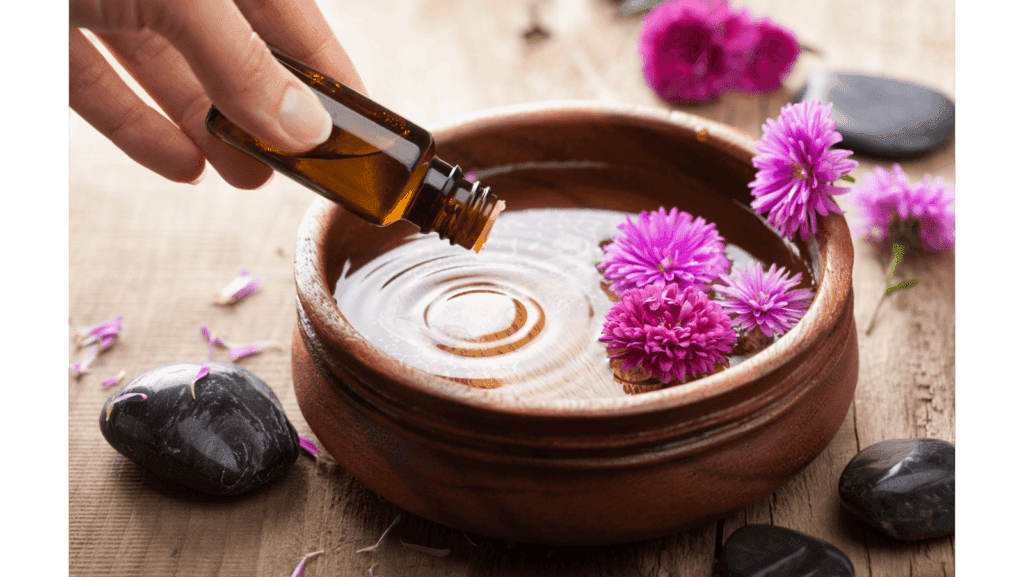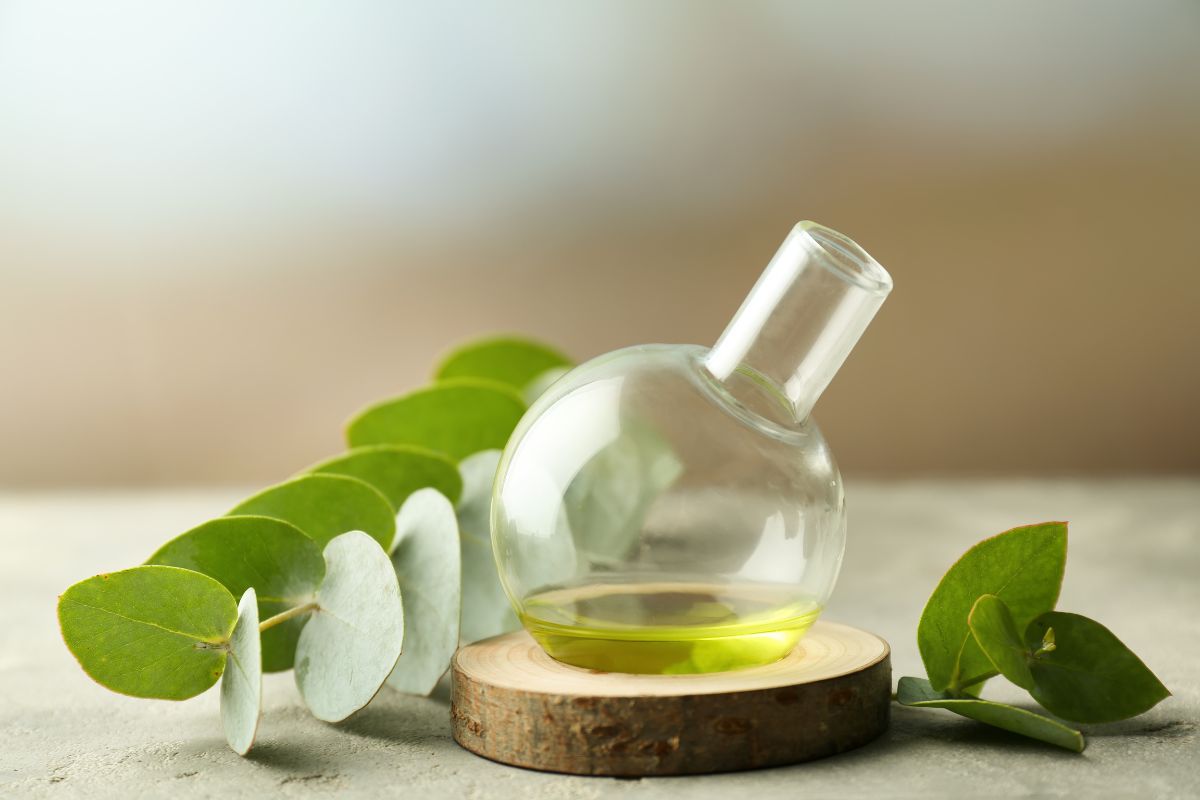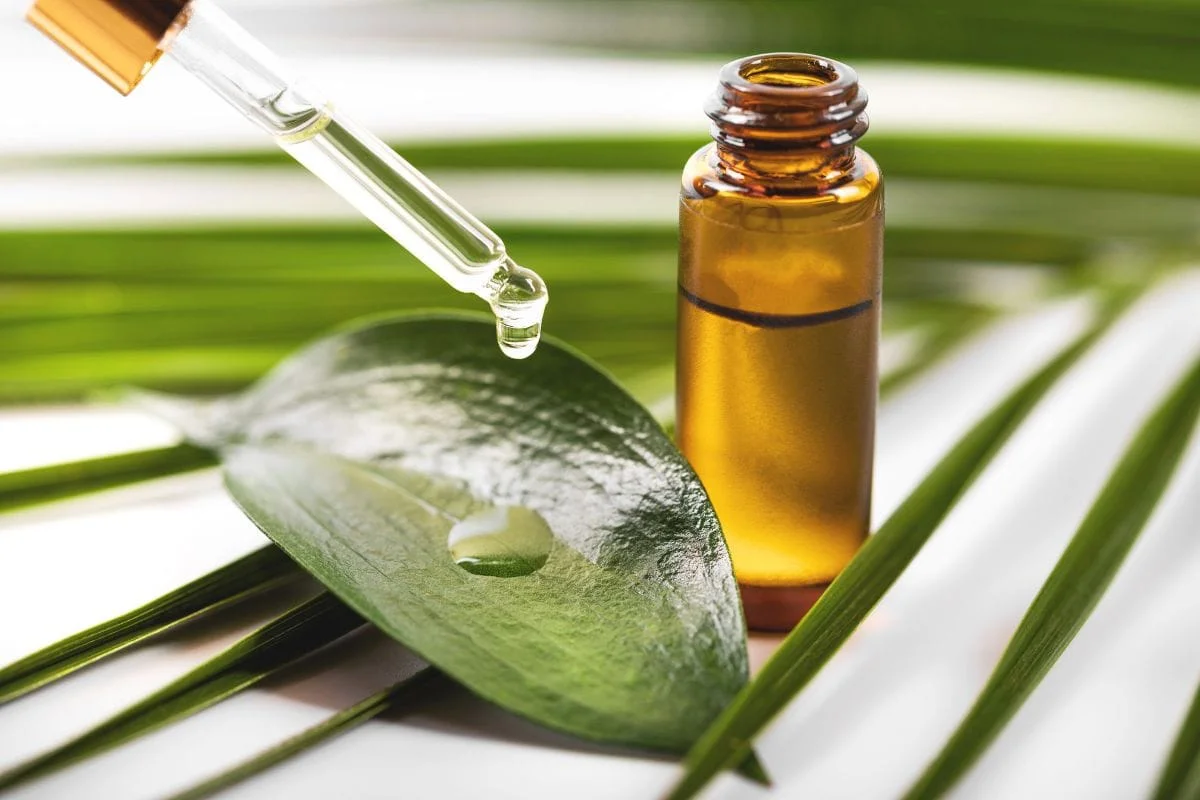“It is through nature, we can find answers to many of our issues, thus lessening our dependence on modern-day drugs.”
Aromatherapy, one of the oldest and most popular forms of holistic medicine, harnesses the power of essential oils to promote healing and well-being. For centuries, people have relied on the bark, leaves, flowers, branches, and roots of plants and trees for natural remedies, rituals, and even transformative experiences. Essential oils give us access to the enchanting world of mother nature’s powers, providing nourishment to every living thing since the beginning of time.
We can unlock this untapped source of healing energy through essential oils, thanks to their strength and natural therapeutic properties! Learn all you need to know about essential oils, their benefits, and how you can use them to boost your health, instantly shift the energy within a space, and draw on the power of nature.
Nature’s remedies have been available to us since plants and trees sprouted on Earth. Essential oils are like a gateway to their power which provides us with something extraordinary.
Nature’s remedies have been available to us since plants and trees sprouted on Earth – essential oils are like a gateway to their power which provides us with something extraordinary!
Getting To Know Power of Essential Oils
- What is Aromatherapy with Essential Oils?
- Science Explains how these Powerful Oils Impact Mood and Brain Activity
- How Essential Oils Can Improve Your Skincare Routine
- Understanding the Difference between Natural and Synthetic Oils
- How can you tell if an essential oil is 100% pure?
- What are carrier oils?
- Is it safe to use Essential Oils on or around our Furry Friends?
What Is Aromatherapy With Essential Oils?
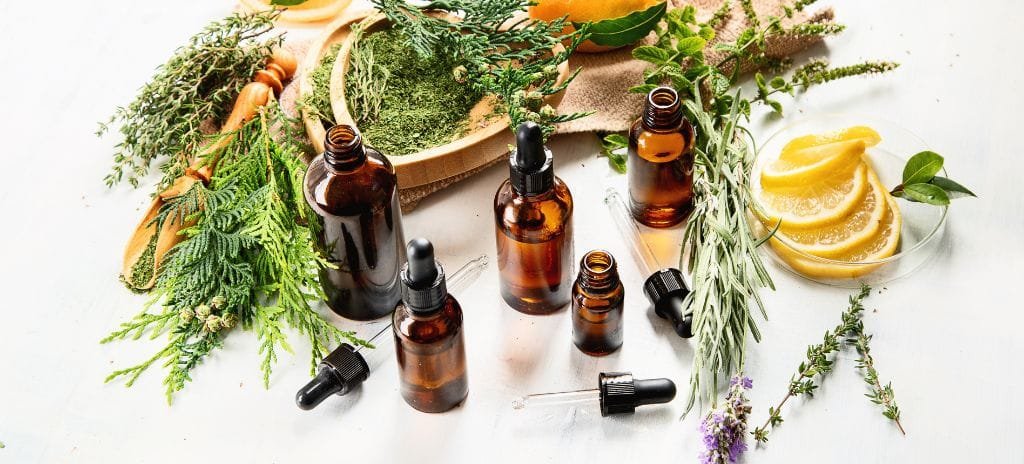
Aromatherapy is a holistic practice that uses the power of scents to improve well-being. It uses essential oils, which are extracted from various parts of plants and herbs such as the root, leaf, or bark through different distillation methods.
The Science Behind These Powerful Oils: Their Effect On Mood And Brain Activity
Aromatherapy has been around for centuries! Studies demonstrate that not only do these highly concentrated extracts possess therapeutic properties, but they are quite powerful tools to alter mood and influence brain activity.
Ancient civilizations like the Greeks, Egyptians, and Romans used them to improve their physical, emotional, and spiritual health. In fact, there is even reference to aromatic oils in the Bible referring to their use since 4500 BC. The ancient Egyptians also used aromatic oils in their beauty and health regimens, as they were known for their advanced knowledge of herbal remedies and cosmetic practices. These are some of the ways essential oils affect us:
We now understand how these natural aromas affect our brain activity directly influencing us on a physiological level, something that has been understood by ancient people and cultures for centuries.
For instance,
- Memory: Aromas of essential oils stimulate memory in a remarkable way. Compounds in the oil interact with the brain’s limbic and amygdala systems, which are responsible for emotion and memory. As a result, certain scents trigger strong emotions and memories.
- Relaxation, Creative thinking, and Meditation: Studies have shown that inhaling essential oils can rapidly increase Alpha and Theta brainwave activity. Generally, alpha waves are associated with relaxation, whereas theta waves are associated with creative thinking and meditation.
- Reduce Stress & Anxiety: The increase in both alpha and theta brainwaves reduce stress and anxiety. To reduce anxiety and stress, these oils can be combined with other treatments such as massage, yoga, and acupuncture.
- Serotonin: They increase serotonin production (our happy hormone) and increase energy – which is also caused by an increase in alpha and theta brain waves.
- Reduce Cortisol: Inhaling essential oils has also been found to reduce cortisol, the stress hormone. Lavender and rosemary inhalation has been shown to reduce stress, anxiety and depression.
- Dopamine: A neurotransmitter responsible for pleasure sensations, dopamine can also be stimulated by essential oils.
- Reduce the risk of Cardiovascular disease: Some essential oils can regulate our heart rate, breathing patterns, and even our body temperature (basil, clary sage, eucalyptus, lavender, and ylang ylang).
Understanding The Difference Between 100% Pure Essential Oils And Synthetic Oils
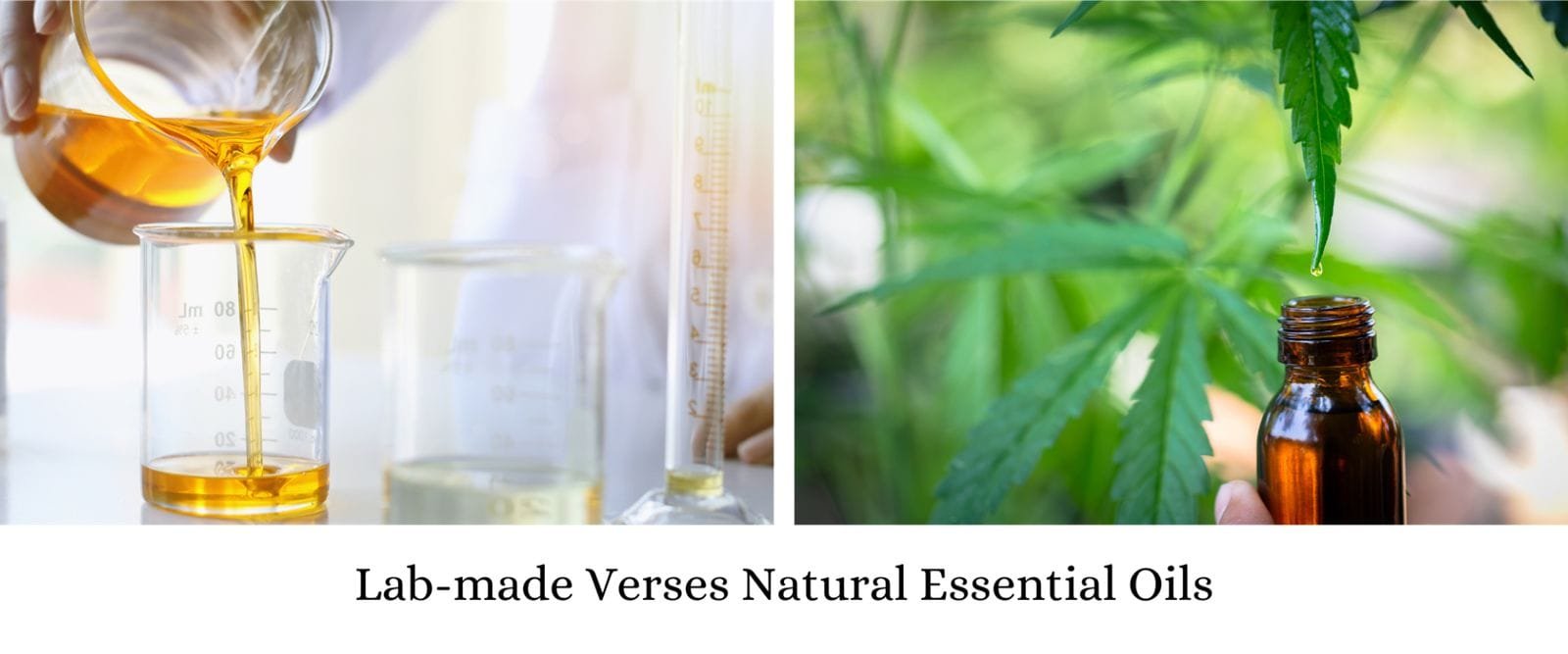
It’s important to know when shopping for essential oils whether they are natural or synthetic. Natural oils are extracted directly from plants whereas synthetic oils merely imitate natural oils without supplying any therapeutic benefits. Also, due to the chemicals used, some people report allergic reactions such as headaches, sore throat, or even nausea when exposed to synthetic aromas.
Pure essential oils are precious and powerful with distinct aromatics that have unique therapeutic properties that synthetic lacks.
For example, the scent of natural peppermint oil has a distinctively clean and minty aroma, while the synthetic version can smell more like chemicals.
These natural aromas can vary depending on where it was harvested and other environmental factors. While this can make them lack consistency as compared to synthetics, natural essential oils hold the inherent energy and spirit that comes directly from their original plant source – this is absent in synthetically produced alternatives – making pure a far better choice!
Synthetic oils are designed to mimic the natural aromas of essential oils, created in a lab using man-made molecules; they can at times smell almost identical to the real thing.
Nevertheless, natural essential oils will always be superior to synthetic scents, even though synthetics are more affordable and consistent. They, however, lack the intimate bond to the woods and the meadow, sunlight and rain, or the changing of seasons and cycles. They cannot match the strong connection to nature that natural essential oils can offer, unlocking a special kind of alchemy that is precious beyond measure.
For holistic aromatherapy and treatments, choose natural over synthetic – it’ll make all the difference!
How Can You Tell If An Essential Oil Is 100% Pure?
The following nine ways can be used to find out:
Check the source, such as the plant species and country. As an example: “This lavender oil from France is sourced from Lavandula angustifolia, a plant.”
It should be clearly labeled without any vagueness. Example: The label clearly states ‘100% pure, steam-distilled peppermint oil’ without any additional additives.”
Observe consistency in color and texture. For example, reputable eucalyptus oil is always pale-yellow in color and fluid in texture.
Look for a strong, natural fragrance. For instance, rosemary oil emits a robust, natural aroma similar to rosemary.
Expect therapeutic effects associated with the plant. Example: “Tea tree oil is known for its antibacterial and anti-fungal properties, consistent with its therapeutic nature.”
Higher quality oils may be more expensive. Example: “This organic, cold-pressed lemon oil costs more than lower-priced brands because of its quality.”
Check third-party testing reports. Example: “GC-MS analysis reports from this reputable brand ensure purity and composition.”
Read customer reviews for brand reputation. Example: “Reviews highlight the consistency and effectiveness of this brand’s lavender oil.”
A label specifying “100 percent pure essential oil” indicates that the oil is completely derived from the named botanical source and does not contain any additives or synthetics.
How the Power of Essential Oils Can Improve Your Skincare Routine
Recent years have seen a rise in essential oil use in skincare due to the potential benefits they may have for a wide range of skin concerns.
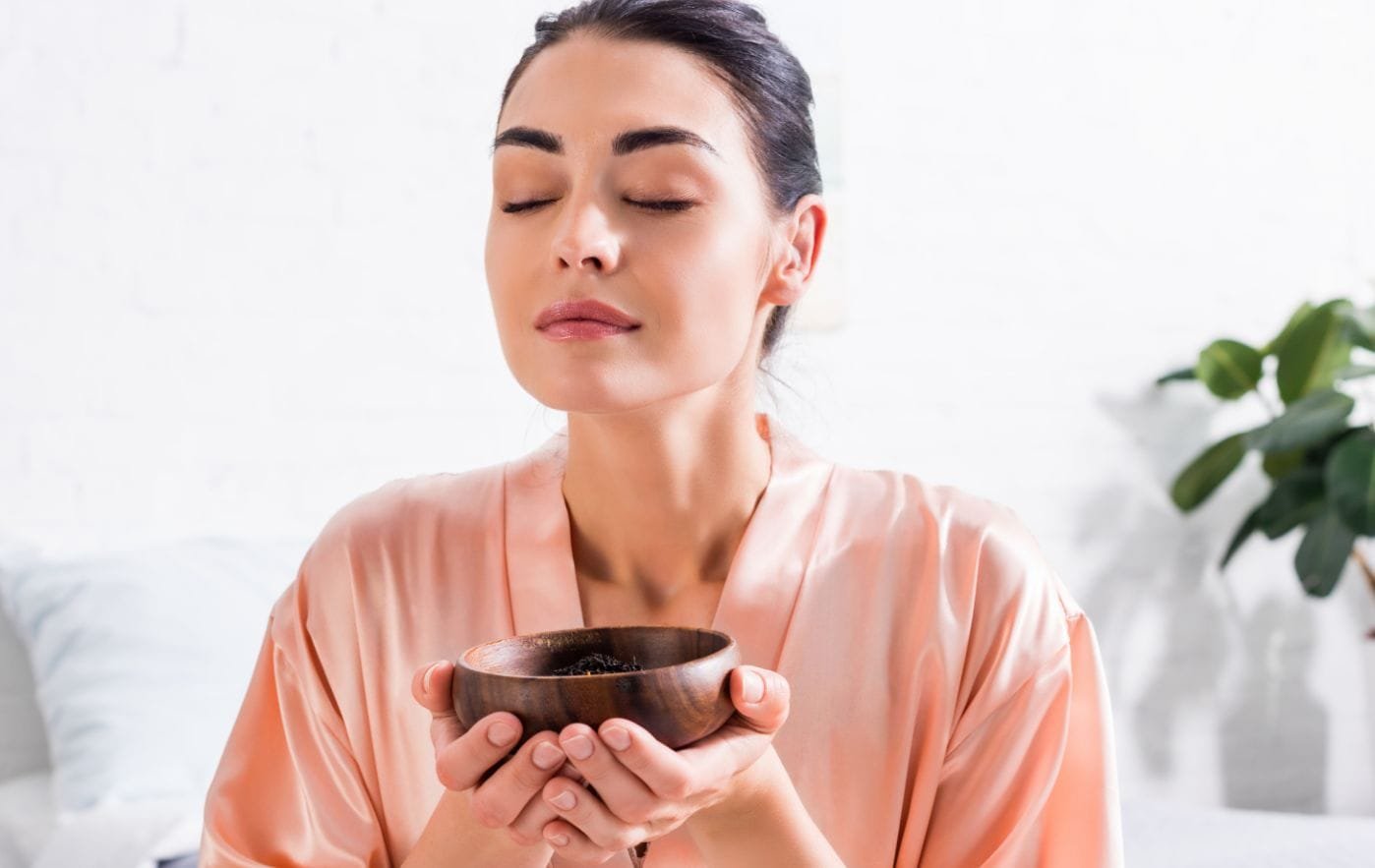
Here’s how using essential oils really can make your skincare routine better:
- Hydration and Nourishment: Jojoba, coconut, and lavender oils help moisturize and nourish the skin, making it soft and supple. They’re rich in fatty acids and antioxidants that penetrate the skin and nourish it.
- Anti-inflammatory Properties: Many essential oils, including chamomile, frankincense, and tea tree, have anti-inflammatory properties that can soothe irritated skin conditions.
- Antibacterial and Antimicrobial Effects: There are a number of essential oils that have antibacterial and antimicrobial properties that can help combat acne-causing bacteria and prevent skin infections.
- Wound Healing and Regeneration: Besides promoting wound healing and skin regeneration, essential oils like lavender, frankincense, and helichrysum contain anti-inflammatory and antioxidant properties that can repair damaged skin cells.
- Skin Tone Balancing and Brightening: Antioxidants and vitamin C in essential oils like lemon, grapefruit, and bergamot can help brighten the skin and even out its tone.
- Anti-aging Effects: Oils such as rosehip, neroli, and sandalwood are rich in antioxidants and promote collagen production, which reduces wrinkles and fine lines.
How to Use Them in Your Skincare Routine
- Carrier Oil Dilution: You can dilute essential oils by mixing them with carrier oils, like jojoba, coconut, or almond, before applying them to the skin. This helps to dilute their potency and prevents skin irritation.
- Facial Steaming: Pour some drops of essential oil into hot water and drape a towel over your head to create a steam, which opens your pores and allows the essential oil to penetrate the skin.
- DIY Skincare Products: Choose oils suitable for your skin type and concerns to incorporate into homemade skincare products, such as face masks, serums, and moisturizers.
- Massage Therapy: Use essential oils in massage therapy to relax muscles, improve circulation, and improve skin health.
NOTE: Always use essential oils with caution, as they are highly concentrated. Before using any new essential oil, it is recommended to patch test it on a small area of your skin after diluting it with a carrier oil. Keep essential oils out of the reach of children and pets. Do not ingest essential oils.
Get personalized advice from a dermatologist or aromatherapist on how to incorporate essential oils into your skincare routine.
What Are Carrier Oils?

Carrier oils are natural, plant-based oils used to dilute essential oils before applying them to the skin. These oils are derived from the fatty parts of plants, such as seeds, nuts, or kernels.
In addition to having their own therapeutic properties, these oils can also be used to “carry” or dilute essential oils, which are highly concentrated and can irritate the skin if applied directly. The carrier oil helps to safely apply essential oils for massage, aromatherapy, skincare, and hair care. The oil of coconut, jojoba, almond, grapeseed, and olive is one of the most common carrier oils.
These oils are powerful! and should not be seen as merely another passing trend that fails to make a difference – they are so much more than that! Dismissing their power would be a disservice to the the quality and incredible benefits they provide. Their potency and effectiveness make them an invaluable addition to anyones lifestyle.
Even today, research continues to reveal new ways in which they can be used. So next time you need a little lift, try some aromatherapy oils! You might just be surprised at the results.
Is It Safe To Use Essential Oils On Or Around Our Furry Friends?
The answer depends on the type of animal and its sensitivity. Diluting essential oils with a carrier oil before using them topically is always recommended, and many essential oils are safe for cats, dogs, and horses when used correctly.
It’s best to consult a veterinarian before giving essential oils to your pets or using them around them. However, when safe, essential oils can be an effective natural remedy for common pet health issues like skin irritation, fleas, and anxiety.
Here is more on:
Point of Alignment
“Essential oils, with their roots deep in nature’s pharmacy, offer us a precious gift”.
They not only heighten our senses but also influence our well-being. As we navigate the world of aromatherapy, let’s remember to choose the natural over synthetic. It is in this authenticity that we find the true essence of healing. Let the scents of nature guide you on this journey toward wellness.

